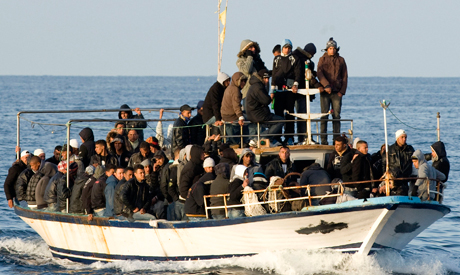
In this March 7, 2011 file photo, a boat loaded with migrants is spotted at sea off the Sicilian island of Lampedusa, Italy (AP)
NATO is ten weeks away from launching a naval mission off Libya as part of a controversial US-backed plan to close the Western Mediterranean migrant route to Europe, officials said Monday.
The advanced state of preparations for the operation was revealed by Italian Defence Minister Roberta Pinotti as leaders of the US, Britain, France, Germany and Italy met in Germany.
Their talks were due to touch on the migrant crisis and instability and Islamist infiltration in Libya.
Modelled on an existing NATO operation in waters between Turkey and Greece, the Libya mission is set to be approved by NATO leaders at a Warsaw summit on July 7, Pinotti said in an interview with Italian daily La Stampa.
The plan forms part of a broader Italian strategy to stop migrants using Libya as a launchpad for reaching Europe by flying those with no claim to asylum back to their home countries, which will be paid to set up reception centres to reintegrate them.
The plans have been slammed by refugee and rights groups and the EU has also come under fire from Pope Francis for what the Catholic leader sees as an arbitrary distinction between asylum seekers and economic migrants.
But it became clear Monday that the strategy has already secured US President Barack Obama's approval.
"The United States would be supportive of a NATO mission in the central Mediterranean," a senior US official told reporters.
Germany has indicated it will support a naval mission to stop more weapons flooding into Libya, but wants it under EU rather than NATO command, officials said.
Britain is likely to be uncomfortable with that in the run-up to its June referendum on EU membership.
More than 350,000 migrants have reached Italy on boats from Libya since the start of 2014.
Aid organisations say over half have a legitimate claim to refuge from persecution or conflict.
But this year's influx has been overwhelmingly from sub-Saharan Africa, a region the European Union considers safe for people to be returned to.
Under Italy's proposals, an existing NATO mission, Operation Active Endeavour, would be "recalibrated" into one overseeing the Libyan coast.
NATO's operation to stop migrant boats reaching the Greek islands from Turkey is the first of its kind for an alliance still seeking to define its role in the post-Cold War world.
An operation off Libya would be more complicated given the presence in some coastal regions of Libya of Islamic State fighters.
The NATO presence could act as a deterrent to traffickers putting to sea with their human cargoes.
But it is thought unlikely they would seek to turn boats back on the model Australia has adopted in recent years.
"It is worth remembering that Libya is not party to the Geneva convention and that conditions in its detention centres are appalling," said Libya expert Mattia Toaldo.
"I don't think NATO will turn boats back but I do think Italy will start flying people home direct from Sicily."
Pinotti said she would be seeking support for this "difficult" option in Hanover.
"This is the road to follow, combined with respect for human rights and support for countries of origin to handle the repatriated," she said.
Any repatriations depend on readmission agreements being concluded with individual countries. African leaders showed little enthusiasm for that at a summit with their EU counterparts in Malta last year but Brussels' vast aid budget means it has plenty of leverage if needed.
Libya's fledgling national unity government last week offered to enter into a Turkey-style deal with Italy to take back migrants, but such an accord is seen as a distant prospect because of the rights and safety issues.
Italy is preparing to lead a UN-backed peacekeeping force into Libya, if and when the new government is deemed to have obtained sufficient authority to ask for international help in stabilising the country.
The 6,000-strong force will be charged primarily with training up Libyan security forces but will be able to call on US warplanes and drones based in Italy for its protection if required.
Short link: